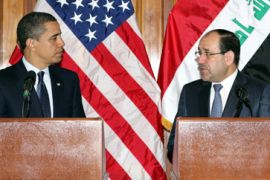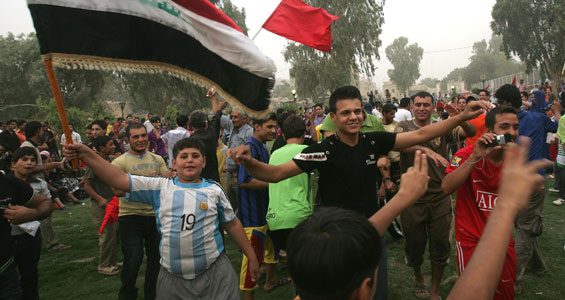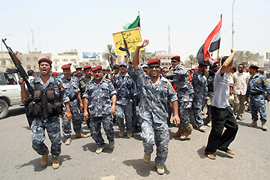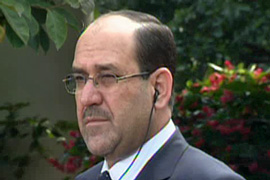Iraqi public key to security deal
Political analyst says failure to hold security referendum threatens stability.

 |
| The Iraqi public is waiting to see how the US abides by three key elements in Sofa [GETTY] |
The Iraqi government has once again failed to meet its obligations as the deadline for a referendum on the security agreement between the US and Iraq has come and passed.
The original bilateral security agreement, sometimes referred to as the Status of Forces Agreement (Sofa), was signed in November 2008 and conditionally ratified by the Iraqi parliament shortly thereafter.
The parliament stipulated that the people of Iraq would have the final say on the status of US forces in the country in a general referendum originally scheduled for July 31, 2009.
While the cabinet of Nuri al-Maliki, the Iraqi prime minister, had allocated $100 million for the referendum, it had urged postponing it until January 16, 2010.
Meanwhile, the parliament was meant to pass a “referendum law” to establish the process and date of the referendum, but even this legislation has not yet materialised.
Biding time
The two alternatives that have been proposed to remedy the situation are delaying the referendum for a few weeks – an option that most Iraqi parliament members support – or postponing it until January 2010 – a date which coincides with parliamentary elections.
If the Iraqi public were to vote ‘yes’ on the referendum, the timeline for troop withdrawal would proceed as established by the security agreement, which holds that all US troops must leave Iraq by December 31, 2011.
However, if the Iraqi public were to vote ‘no’ on the referendum it would oblige the Iraqi executive branch to immediately inform the US government of their intent to terminate the agreement, triggering the one-year cancellation clause [article 30 of Sofa].
Under this scenario, US troops would be required to completely withdraw from Iraq within one year of the ‘no’ vote and not wait until the end of 2011.
Determining indicators
 |
| Sovereignty and the debate over war reparations are key issues for Iraqis [GETTY] |
Iraqi public opinion regarding the security agreement is shaped by a range of issues, including Iraqi perception of the US’ spotty record in honouring treaties and the last 19 years of Washington’s intervention in Iraq.
But the most important three indicators that will likely determine how Iraqis will vote on the referendum will be more poignantly shaped by US actions in upholding three key elements of the Sofa agreement.
First is the adherence to the terms of withdrawal of US combat forces from Iraqi cities, towns and villages.
The US did comply with the June 30 deadline as agreed, but there have been a number of incidents to date that were viewed by the Iraqi public as breaches of the security agreement.
Last week, for example, US troops killed three Iraqis and wounded another four, including two children, in what the US claims was an exchange of fire near Baghdad, the Iraqi capital.
The incident gained national interest after an Iraqi army officer tried to arrest the US soldiers involved, but al-Maliki ruled out any such action and said the US troops acted in “self-defence”.
This and other similar incidents have fuelled Iraqi scepticism and criticism of the agreement.
Releasing prisoners
The second hurdle involves the release of Iraqi prisoners in US custody.
The US military is still holding more than 10,000 Iraqis in prison, many without charges or access to lawyers. The security agreement requires all non-convicted prisoners to be released and all convicted ones to be handed over to Iraqi custody as soon as possible.
US state department sources have indicated that the current plan is to release all Iraqi prisoners before the end of this year. If this turns out to be true, it will have a positive impact on Iraqi public opinion regarding the security agreement.
The third challenge is ending all the active provisions under Chapter VII of the UN charter.
Article 25 of the Sofa says: “Iraq should return to the legal and international standing that it enjoyed” prior to 1990, and that “the United States shall use its best efforts to help Iraq take the steps necessary to achieve this by December 31, 2008”.
Limited sovereignty
 |
| Al-Maliki’s cabinet has earmarked $100 million but suggested holding the referendum in 2010 |
Since the Iraqi invasion of Kuwait in 1990 Iraqi sovereignty has been limited by a number of resolutions under Chapter VII.
Chapter VII of the UN Charter allows the security council to “determine the existence of any threat to the peace, breach of the peace, or act of aggression” and to take military and non-military action to “restore international peace and security”.
The fact that there are still 73 active resolutions against Iraq on the books may seem to be a technical issue on the US side, but it is viewed widely as a matter of national pride and sovereignty in Iraq.
When al-Maliki visited Washington DC last week, Barack Obama, the US president, promised to “work diligently with Iraq so that in fact Iraq is no longer within Chapter VII”.
But a recent report released by the office of Ban Ki-moon, the UN secretary-general, indicated that the Security Council is unlikely to lift all of the outstanding Chapter VII-related resolutions any time soon.
The main obstacle now is that Kuwait wants Iraq to continue paying reparations for its 1990 invasion, and the existing compensation system is structured as a provision under Chapter VII.
The US government has not played a role so far in brokering a bilateral agreement between Iraq and Kuwait that would help change the structure of this compensation.
If the Iraqi referendum is held while Iraq is still dealing with active provisions under Chapter VII there is a very slim chance the Iraqi public would approve the security agreement.
Although the referendum will not take place this week as the agreement requires, there is still a reasonable possibility it will take place within the next six months.
Unless US policymakers take the issues shaping Iraqi public opinion seriously, the final deadline for all US troops to be withdrawn will very likely come much sooner than the US has intended.
Raed Jarrar is an Iraqi-born architect, blogger, and political analyst. He is the Iraq consultant for the American Friends Service Committee.
The views expressed in the above column are the author’s own and do not necessarily reflect Al Jazeera’s editorial policy.